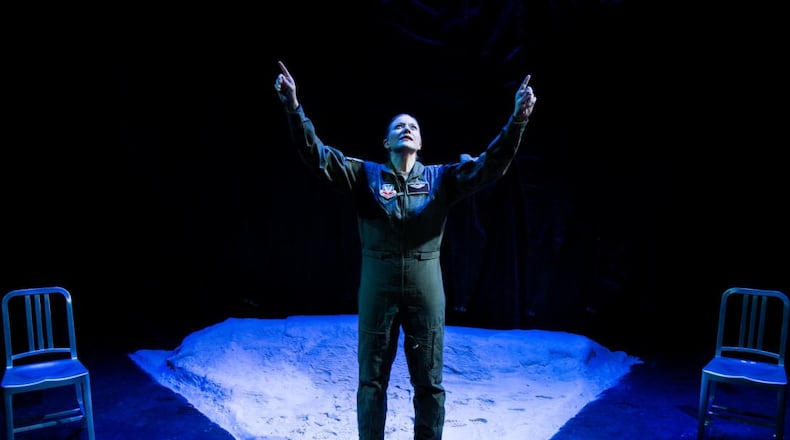You might think of “Grounded” as a sort of contemporary sequel to “Top Gun.” Like the gung-ho 1986 film, playwright George Brant’s hit 2013 one-woman play — currently getting a strong production from the Atlanta Theatre Club at Atlanta’s 7 Stages Theatre — tells the story of a devoted military fighter pilot who loves nothing more than the full-throttled thrill of combat flight.
But unlike the characters in “Top Gun,” the pilot in “Grounded” is forced to deal with a totally new form of warfare. Brant’s play was among the first to take on the subject of drones, unmanned aerial vehicles. In drone warfare, the target remains on the field of battle, but the pilot sits behind a desk half a world away, radically altering the nature of warfare. Brant’s play compellingly explores the human and psychological ramifications of that major new technological shift through the eyes of one character.
An unexpected pregnancy forces the unnamed female pilot in “Grounded” (played here by actress Courtney Moors) to take maternity leave. Upon her return, she gets a new assignment — flying a drone. It’s work that the independent, forceful and flight-loving character loathes. She glumly refers to it as “the chair force,” and she’s forced to sit behind a desk staring at a gray screen all day in an anonymous trailer in the desert outside of Las Vegas. But the pilot slowly becomes addicted to the sense of power, of being a removed, godlike observer with the ability to deliver death by remote control to what she calls “the guilty.” She initially adjusts to the new work, but the strange dichotomies it creates — the pilot leaves a typical American toy-strewn home each morning to engage in military combat in the desert half a world away — ultimately prove impossible for her to reconcile, and her state of mind begins to unravel.
The play often uses the pilot’s situation as a stereotypical metaphor for a woman’s simultaneous and incompatible desires for both independence and home: that dichotomy is compelling enough, but it turns out to be less rich and dramatic than one might initially expect. As metaphors, the flying and the groundedness arrive pre-interpreted, and the pilot’s situation is so singular that the character runs the risk of becoming an almost purely symbolic invention.
MORE THINGS TO DO: Zoo Atlanta’s baby monkey now has a name
Moors wisely gives us a very individualized pilot; her strengths, her independence, her weaknesses, her love for her husband and daughter have a great specificity and individuality here. The pilot is admirably ambitious, unapologetic, independent, enthusiastic and idiosyncratic, so the final crack-up seems believable and sympathetic. And ultimately, the story takes a turn for the better in its development as a tale about surveillance. Unlike in the air where she is “alone in the vastness,” on the ground, the pilot is both observing and observed, with an anonymous life-and-death power over others that she’s shocked and horrified to discover that others have over her.
The play was a hit at the Edinburgh Fringe Festival, where it had its world premiere, and actress Anne Hathaway played the role of the pilot on an elaborate, complicated set when the play had its American premiere at New York Public Theatre. Designer Elizabeth Jarrett keeps things stark and simple: the use of a simple parachute back-drop, which can rise or fall away, is surprisingly inventive and effective, and Jennifer Silver’s video projection of a lifesize pilot captures the play’s sense of an individual objectified by technology, both as its controller and its subject.
Directed by Rebeca Robles, “Grounded” never offers any easy answers about drone technology or the nature of warfare, but the small, one-woman show nonetheless delivers a powerful punch and feels uncomfortably believable in the way it confronts the implications of a new form of warfare.
Bottom Line: A strong, minimalistic production of a compelling one-woman show.
Atlanta Theatre Club presents “Grounded”
$22. Through August 17. at 8 p.m. Wednesdays to Sundays. 7 Stages. 1105 Euclid Ave. (in Little Five Points). Atlanta. 404-523-7647,
About the Author
Keep Reading
The Latest
Featured





